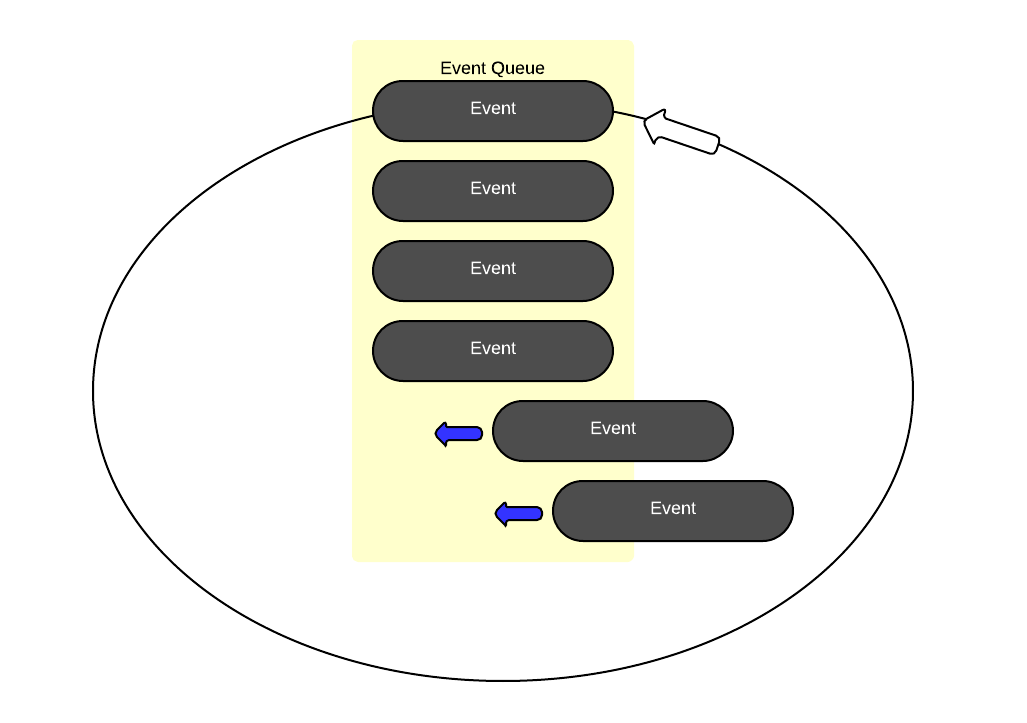Introduction to Vert.x
Toby Crawley
toby@tcrawley.org
What is Vert.x?
- Asynchronous polyglot application platform
- JVM based
- Similar to Node.js, but not a clone
- Thread safe (pretend you're the only one)
Polyglot
- Java
- JRuby
- Jython
- JavaScript/CoffeeScript (Rhino/DynJS (in-progress))
- Groovy
- Scala (in-progress)
- Clojure (in-progress)
- All with a similar API
Provides
- Async TCP/HTTP/HTTPS/Websocket clients
- Async TCP/HTTP/HTTPS/Websocket servers
- Distributed event bus
- Timers
Why Async?
- What?
- Back to work!
- Thousands of concurrent connections
- Speed
415,000 requests/sec
Java Example
HttpClient client = vertx.createHttpClient() .setHost("foo.com") .setPort(8080); // Create a request with a response handler client.get("/some-path/", new Handler<HttpClientResponse>() { public void handle(HttpClientResponse resp) { log.info("Got a response: " + resp.statusCode()); } }) .end();
Ruby Example
client = Vertx::HttpClient.new client.host = 'foo.com' client.port = 8080 # Create a request with a response handler client.get('/some-path/') { |resp| puts "got response #{resp.status_code}" }.end
Clojure Example
(require '[vertx.http :as http]) (-> (http/client {:host "foo.com" :port 8080}) (http/request :GET "/some-path/" (fn [resp] (println "got response" (http/status-code resp)))) http/end)
Verticles
- The unit of deployment
- Many in one (any language)
Verticles
Start with a verticle:
vertx run my_app.js -conf cfg.json -instances 3
Deploy one programmatically:
vertx.deploy_verticle('my_app.clj') do |err, deployment_id| puts 'deploy successful!' unless err end
Event/Reactor Loop

Event/Reactor Loop(s)
- Defaults to one/processor
- Verticle tied to one loop (so one thread)
- Thread safety
DON'T BLOCK THE EVENT LOOP
Thread.sleep()Object.wait()CountDownLatch.await()or any other blocking operating fromjava.util.concurrentwhile(true) {puts "King of the world!"}- Long-lived computationally intensive operations
- Blocking operations that might take some time to complete (e.g. DB query)
Worker Verticles
- Can block
- Uses thread pool
- Verticle still called by one thread at a time
Modules
- The unit of distribution
- Reusable, shareable artifacts (zip files)
- Can contain verticles
- Can depend on other modules
Timers
- Do something in the future
- One-shot & periodic
Timers
(require '[vertx.core :as v]) (v/timer 5000 (println "I'm 5 seconds in the future!")) (v/periodic 2000 (println "I SHOUT EVERY 2 SECONDS!!!")) (println "I'm printed before either of those yahoos")
Eventbus
- Message passing between components
- Scalars & JSON
- Inter/intra verticle/cluster nodes
- Point-to-point
- Request/respond
- Broadcast
Javascript Example
var eb = vertx.eventBus; eb.registerHandler('global.notifications', function(message) { console.log('Message rcvd: ' + message); }); eb.registerHandler('some.address', function(message, replyFn) { console.log('Message rcvd: ' + message); replyFn('Roger that'); }); // publish to all handlers eb.publish("global.notifications", {some: "value"}); // send to one handler and handle the reply eb.send("some.address", "ahoyhoy", function(message) { console.log("Reply: " + message); });
Clojure Example
(require '[vertx.eventbus :as eb]) (eb/register-handler "global.notifications" (fn [m] (println "Message rcvd:" m))) ;; A replying handler (eb/register-handler "some.address" (fn [m] (println "Message rcvd:" m) (eb/reply "Roger that"))) ;; publish to all handlers (eb/publish "global.notifications" {:some "value"}) ;; send to one handler and handle the reply (eb/send "some.adress" "ahoyhoy" (partial println "Reply:"))
Clustering
- Distributed event bus
- Efficient distribution
vertx run my_app.py -cluster & vertx run my_app.py -cluster
To the browser
- Browser is a peer in the eventbus
- SockJS
- Live demo at the end
SharedData
- Share maps or sets between verticles
- Only store immutable things
SharedData
hash = Vertx::SharedData.get_hash('demo.myhash') hash['some-key'] = 'some-value'
And then, in a different verticle:
hash = Vertx::SharedData.get_hash('demo.myhash') puts "value of some-key is #{hash['some-key']}"
"Callback Hell"
"Callback Hell"
HttpClient client = vertx.createHttpClient() .setHost("foo.com") .setPort(8080); client.get("/some-path/", new Handler<HttpClientResponse>() { public void handle(HttpClientResponse resp) { resp.bodyHandler(new Handler<Buffer>() { public void handle(Buffer buf) { vertx.eventBus().send("some.worker", buf, new Handler<Message<String>>() { public void handle(Message<String> m) { if ("ok".equals(m.body())) { client.post("/a-ok/", new Handler<HttpClientResponse>() { public void handle(HttpClientResponse resp) { //do more! } }).end(); } } }); } }); } }).end();
"Callback Hell"
- Don't use Java :)
- Use RxJava
"Callback Hell"
HttpClient client = vertx.createHttpClient() .setHost("foo.com") .setPort(8080); RxHttpClient rxclient = new RxHttpClient(client); RxEventBus rxbus = new RxEventBus(vertx.eventBus()); rxclient.get("/some-path/") .mapMany(downloadBody()) .subscribe(new Action1<Buffer>() { public void call (Buffer buf) { rxbus.send("some.worker", buf) .mapMany(new Func1<RxMessage<String>>, Observable<RxMessage<String>>>() { public Observable<RxMessage<String>> call(RxMessage<String> m) { if ("ok".equals(m.body())) { rxclient.post("/a-ok/") .subscribe(new Action1<HttpClientResponse>() { public void call (HttpClientResponse resp) { //do more! } }); } } }); } });
Drawbacks
- D.B.T.E.L.
- Callback Hades
- Standard packaging systems
- Lack of frameworks
